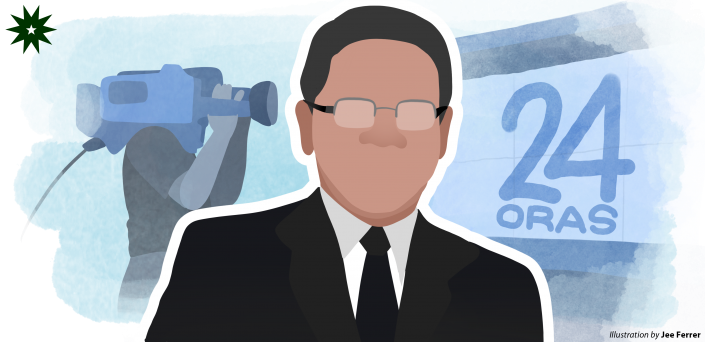One might imagine the mere presence of Mike Enriquez, surrounded by awards garnered throughout his illustrious career, exuding an aura of intimidation. After all, who doesn’t know the Mike Enriquez?

Yet, he radiates understanding and comfort. A household name, the man is more familiar than he is intimidating; the mere mention of his name brings many back to a voice heard on the radio every day, and to a face seen on television every night. With an infectious smile on his face, it’s easy to see oneself greeting the man as one would an old friend—one they’ve known for years.
But beyond the veneer of being a distinguished journalist and media icon, who is Mike Enriquez?
Redirected
As a young sacristan, Enriquez served in the 5:30 am mass day after day, rain or shine. “My dream back then, whether you’ll believe me or not, was to become a priest…I wanted to become a Franciscan priest because I grew up among them,” he recalls in Filipino. Having spent most of his time surrounded by Franciscans, their words and experiences kindled his heart for service, igniting a flame which burns until this day.
Now an esteemed newscaster, the path Enriquez has taken is vastly different from the religious background he hails from, but the desire to serve others still lives on. The man who dreamt of facing the altar now faces a camera daily, addressing the entire country.
The manner by which he found this path was rather fortuitous: he happened to be visiting a schoolmate working at a radio station the very same day the station was looking for a new announcer. Cajoled by his friend into auditioning, Enriquez read a piece from that day’s newspaper, and the next words uttered by the manager were, “When can you start training?”
Oh, the humanity
“‘Pag 19 anyos ka, parang ‘yung buong mundo sa’yo eh,” he expresses with a wistful grin, and for a moment, he is that boy again—intoxicated by the promise of tomorrow.
(When you’re 19 years old, the world feels like it is yours.)
He spent the next moments telling tales from his 50-year career: reporting live from Washington, D.C.; seeing both Pope John Paul II and Pope Francis up close; and dining at Malacañang Palace with then-President Gloria Arroyo.
He describes the anecdotes with boyish wonder—as if he still couldn’t quite believe the things he was given the opportunity to witness. “Gusto kong kupitin [‘yung mga plato],” he jokes, recalling the events of the Malacañang dinner.
(I wanted to steal the plates.)
But in other ways, the 19-year-old who said “yes” without hesitation in the radio booth had to grow up. The harsh realities of the world have been made clear to him—having endured sleeping in the desert amid roaring gunfire, caught in the middle of an Abu Sayyaf ambush.
In his stint in Kuwait, Enriquez recalls a particular missile attack that hit one of the upscale malls in the city. Without a second thought, he ran for the mall.
Chuckling in hindsight, he remembers thinking, “My God, there’s something crazy about this work—everybody is running away from the place, [yet] I am running it.”
His experiences may have painted an image of a brave and tenacious man in many people’s eyes, but Enriquez does not shy away from vulnerability—in fact, he embraces it. Being human isn’t just something that elevates journalistic work; it is a necessity.
It is this necessity for empathy that makes the sights he sees all the more painful. In 2000, he was sent to cover the Payatas landslide, the garbage dump collapse that claimed the lives of hundreds of people. While walking around the area with a camera crew, he noticed a little girl crying by the roadside.
“Sir, please tulungan niyo kami hanapin ‘yung nanay ko at ‘yung kapatid ko,” the girl pleaded, pointing towards the enormous garbage heap caused by the landslide. “Please, birthday ko po ngayon.”
(Help us find my mother and my sibling. Please, it’s my birthday today.)
Enriquez instructed the cameramen to stop filming, and they helped the little girl dig through the heap. Hours went by, but there was no sign of her relatives’ bodies. Enriquez completed his coverage and reported from the site that day, and only when he arrived home did he allow himself to cry.
To feel as people feel—to ache as they ache—in order to bring justice to their stories, is both his burden and his mandate.

Live Jesus in our hearts
Even with building a bustling career outside the University’s four walls, Enriquez looks back on and acknowledges his Lasallian education—the saying “Live Jesus in our hearts” being one he holds dear to his heart.
“Kung masusunod ako, dapat may rigid na training ang mga estudyante sa La Salle on the core Lasallian values,” he affirms.
(If it were up to me, students in La Salle should undergo rigid training to instill in them the core Lasallian values.)
As a nostalgic interview with such an iconic figure came to a close, Enriquez reminds journalists everywhere to “keep [their] feet on the ground,’’ emphasizing the importance of humility in his line of work. He does so before yelling another reminder: “Don’t forget to do your taxes!”
Mike Enriquez—ever the joker.
The immense career the man has managed to make for himself is remarkable, and what he was able to touch on in a single interview surely was only a glimpse of the extent of his experiences and insights. Nevertheless, what he’s chosen to share—his upbringing, struggles, and ideals—paint a picture of a man who’s seen it all, and has remained steadfast after all this time.
Enriquez reminds us of what it truly means to be a journalist—to be vigilant for the truth, with an unerring moral compass.
